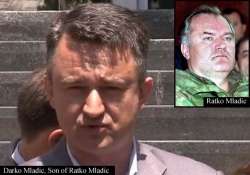Son: Mladic Had Nothing To Do With Srebrenica
Belgrade (Serbia) May 29: Ratko Mladic - charged with genocide by a U.N. war crimes court - claims he did not order the massacre of 8,000 Muslim men and boys in the Bosnian town of

Belgrade (Serbia) May 29: Ratko Mladic - charged with genocide by a U.N. war crimes court - claims he did not order the massacre of 8,000 Muslim men and boys in the Bosnian town of Srebrenica when it fell during the 1992-1995 war, his son said Sunday.
The former Bosnian Serb army commander, known for his brutality during the war, insists that he was not responsible for the mass executions committed by his troops after they overran the eastern Bosnian enclave in July 1995, his son Darko Mladic said.
“Whatever was done in Srebrenica, he has nothing to do with it,” Darko Mladic said.
The massacre in Srebrenica is considered to be Europe's worst atrocity since World War II. Bosnian Serb troops under Mladic's command rounded up the Srebrenica boys and men and executed them in just several days, burying the remains in mass graves in the area.
The U.N. tribunal in The Hague, Netherlands, has indicted Mladic with genocide for the Srebrenica massacre and other atrocities of the Bosnian war. Prosecutors say they have compelling evidence that Mladic personally ordered and oversaw the executions in and around Srebrenica.
The son, Darko, says his father is adamant that the massacre was committed without his knowledge—something that prosecutors have argued is impossible because of the scope of the killings.
“His orders were to evacuate the wounded, the women and the children and then the fighters. Whatever was done behind his back, he has nothing to do with that,” Darko Mladic said.
The 69-year-old former general is being held in a Serbian jail after his arrest last week after 16 years on the run. He was indicted in 1995.
It was not clear when Mladic made the claims about Srebrenica, which his son described as his “general position.”
Mladic's family and lawyers have been fighting extradition, arguing that the general is too ill to face charges.
Serbian authorities have stepped up security throughout the country ahead of an ultranationalist rally planned in central Belgrade on Sunday evening to protest Mladic's arrest.
Similar rallies in the past have resulted in clashes between the police and right-wing extremists.
In Bosnia, some 3,000 supporters arrived Sunday by bus from other parts of Bosnia to his hometown of Kalinovik, many in black T-shirts with Mladic's picture and the words “Serbia in my heart.”
The crowd called Serbian President Boris Tadic a “betrayer” for ordering the arrest of “the Serb hero” and urged him to “kill himself.” Many said they would fight under Mladic again.
Mladic's family plans to demand Monday that a Serbian court order an independent medical checkup to dispute a conclusion by court-appointed doctors that Mladic is fit to stand trial.
“His basic human rights are being violated,” Darko Mladic said.
Prosecutors have dismissed the family's moves as a delaying tactic.
Defense requests appear likely to delay Mladic's extradition until at least Tuesday. His lawyer, Milos Saljic, said he would send an extradition appeal by mail—instead of submitting it personally—in order to gain more time.
Mladic has suffered at least two, and possibly three, strokes, the latest in 2008, his son said. The suspect's right arm is only semi-functional, and his family says he is not lucid.
“It is impossible to talk to him sensibly about usual things, to talk about his defense case,” lawyer Saljic said. “Because he is really in bad shape psychologically.”
Above all, the former commander keeps demanding that he be allowed to visit the grave of his daughter, who committed suicide in 1994.
“He says if he can't go there, he wants his daughter's coffin brought in here,” the lawyer added. “His condition is alarming.”
Saljic said the family does not believe that Mladic would receive proper medical attention in The Hague. He noted that several high-profile Serbs had died there, including former President Slobodan Milosevic with a heart attack. AP